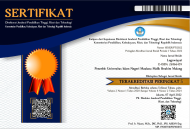Peran Language Immersion Dalam Pembelajaran Bahasa Arab
Abstract
Language Immersion (LI) Is a useful program for second language learning, Second language is a medium for learning all subject matter and some activities in the classroom and also outside the classroom, The language is immersed by students anytime and under any circumstances by listening, speaking, reading, writing, and culture as well. Language Immersion in this study focused on Arabic. Language Immersion In learning Arabic is very important to foster a sense of love for students towards Arabic, Language Immersion Is where a student can prioritize Arabic habituation before understanding the rules of Arabic, Students first know early about language behavior before knowing the grammar to be learned afterwards, Students who do this Language immersion will be able to become good pronunciations of the language as well as This research is a descriptive research analysis where researchers collect all scientific material from original sources then read it and translate it, classify it and compile it into their own writing. What is the importance of the immersion linguistics program in learning Arabic for non-native speakers and 2.What is the Language immersion program. The result of this study is that the Language immersion program is very important in teaching foreign languages and this program has a great position among other foreign language learning programs. This program has the privilege of teaching languages quickly and fluently.
Keywords
Full Text:
PDF (Bahasa Indonesia)References
Ayala Zárate, J. (2020). An Approximation to What Language Immersion Programs are Like. Enletawa Journal, 13(2), 20–47. https://doi.org/10.19053/2011835X.11982
Bakhov, I. (2018, August 20). IMPLEMENTATION OF THE CONCEPT OF LANGUAGE IMMERSION IN LEARNING FOREIGN LANGUAGES. 5th SGEM International Multidisciplinary Scientific Conferences on SOCIAL SCIENCES and ARTS SGEM2018. https://doi.org/10.5593/sgemsocial2018/3.5/S13.052
Caldas, S. J., & Caron-Caldas, S. (1999). Language Immersion and Cultural Identity: Conflicting Influences and Values. Language, Culture and Curriculum, 12(1), 42–58. https://doi.org/10.1080/07908319908666568
Cheng, L. (2012). English immersion schools in China: Evidence from students and teachers. Journal of Multilingual and Multicultural Development, 33(4), 379–391. https://doi.org/10.1080/01434632.2012.661436
Genesee, F. (1985). Second Language Learning Through Immersion: A Review of U.S. Programs. Review of Educational Research, 55(4), 541–561. https://doi.org/10.3102/00346543055004541
Hamzah, H. N., & Fikri, S. (2022). Ta’tsiiru Kholfiyyati al-Tholabah al-Dirosiyyah wa Kafaatihim fi Ta’allumi al-Lughoh al-Arobiyyah lada Tholabati al-Madaaris al-Tsaanawiyyah al-Islaamiyyah bi Malang. LUGAWIYYAT, 4(1), 23–30. https://doi.org/10.18860/lg.v4i1.16165
Mujaddid, A., Qomariyah, S., Fitriyah, R., & Arifa, Z. (2019). Peningkatan Pembelajaran Bahasa Arab Melalui Program IPPBA Dalam Kerangka Manajemen Berbasis Madrasah. Arabia, 11(1), 88. https://doi.org/10.21043/arabia.v11i1.4334
Qiang, H., & Kang, Y. (2011). English immersion in China as a case of educational transfer. Frontiers of Education in China, 6(1), 8–36. https://doi.org/10.1007/s11516-011-0120-8
Rahman, A. (n.d.). Inovasi Pembelajaran Bahasa Arab Bagi Non Arab (Studi Ma’had AMCF). 11.
Supriyono, Y., Saputra, Y., & Dewi, N. S. N. (2020). ENGLISH IMMERSION PROGRAM IN EFL SETTING: A MODIFIED MODEL, IMPLEMENTATION, AND EFFECTIVENESS. 24.
عبد العزيز, أ. / إ. أ. ع. (2022). مدي وعي بعض معلمي اللغة العربية للناطقين بغيرها بمفهوم الانغماس اللغوي في تعليم اللغة الثانية وممارستهم لاستراتيجياته. مجلة القراءة والمعرفة, 22(248), 173–224. https://doi.org/10.21608/mrk.2022.252755
عبد المحسن محمد منصور, ر. (2021). دور الانغماس اللغوی فی تعلیم اللغة العربیة للناطقین بغیرها. حولیة کلیة اللغة العربیة بجرجا, 25(7), 7123–7181. https://doi.org/10.21608/bfag.2021.184967
DOI: https://doi.org/10.18860/lg.v5i1.18060
Refbacks
- There are currently no refbacks.
Indexed By ;
--------------------------------------------------------------------------------------------------------------------------------------------------------------------------------------
Program Khusus Pengembangan Bahasa Arab
Gedung C (Prof. Dr. H. Mudjia Rahardjo., M.Si.) Lt. 1
Jl. Gajayana No 50 Kota Malang, Jawa Timur, Indonesia, Kode Pos 65144,

Lugawiyyat Journal is licensed under a Creative Commons Attribution-ShareAlike 4.0 International License .






